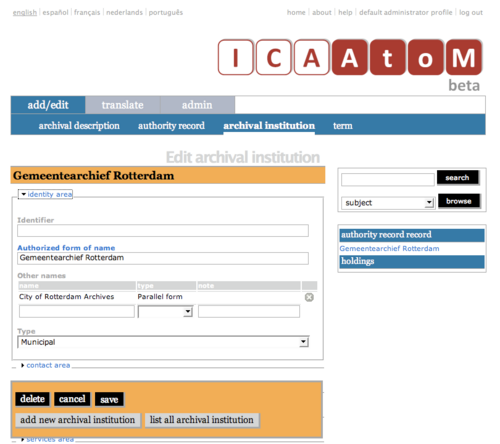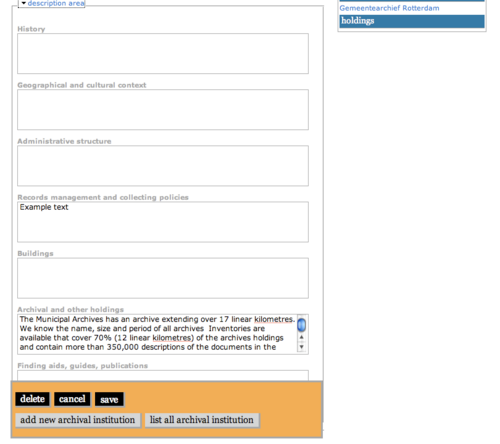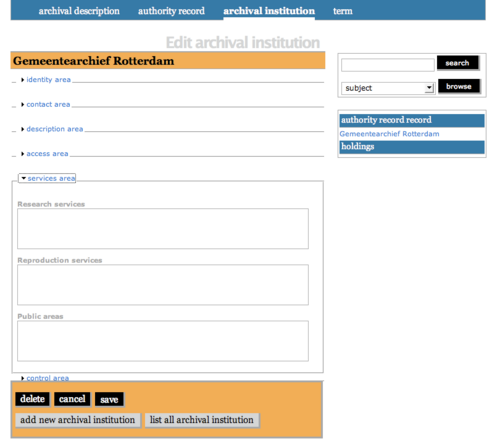Add a new archival institution
Please note that ICA-AtoM is no longer actively supported by Artefactual Systems.
Visit https://www.accesstomemory.org for information about AtoM, the currently supported version.
Add / edit archival institutions
Main Page > User manual > UM-3 Add / edit content > UM3.3 Add / edit archival institutions > UM-3.3.1 Data entry: archival institutions
The Edit screen for archival instiutions is structured into six information areas following the International Standard for Describing Institutions with Archival Holdings (ISDIAH). These are:
Click on an information area to expand it (display fields); click again to collapse it (hide fields). Note that as of the current version of ICA-AtoM (v1.0 beta), whenever you save a record ICA-AtoM re-loads the page, which collapses all areas.
The following notes aim primarily to clarify ICA-AtoM procedures; for guidelines on what information to record in particular fields, consult ISDIAH as the content standard. The notes are organized by field, with links to the applicable ISDIAH section(s). Where there is a one-to-one correspondence between an ISDIAH element and an ICA-AtoM field, the note simply gives the ISDIAH rule verbatim.
Identity area
The "Identity area" contains fields that uniquely identify the archival institution.
1. Identifier
- "Record the numeric or alpha-numeric code identifying the institution with archival holdings in accordance with the relevant international and national standards." (ISDIAH 5.1.1)
2. Authorized form of name
- "Record the standardised form of name of the institution with archival holdings, adding appropriate qualifiers (for instance dates, place, etc.), if necessary. Specify separately in the Rules and/or conventions element (5.6.3) which set of rules has been applied for this element." (ISDIAH 5.1.2)
3. Other names
- Multi-value field for registering and displaying other names by which the institution is known.
- Enter the data (see steps 4-6 below); when you click the Save button in the Button block the name will be registered and will now appear in the list above the data entry fields.
- There is no limit to the number of other names you can add, but as of the current version of ICA-AtoM (v1.0 beta) you can only register them one at a time, i.e. enter the data, click the Save button, repeat for each additional name.
- To delete an other name, click the Delete icon next to it in the list.
- For rules and examples, see (ISDIAH 5.1.3 and 5.1.4).
4. Other names - name
- Enter the other name.
5. Other names - type
- Select the type of name from the drop-down value list.
- ICA-AtoM ships with a default value list, but this can customized by editors and administrators.
6. Other names - note
- Enter any other information relating to the other name.
7. Type
- "Identify the type of the institution with archival holdings." (ISDIAH 5.1.5)
- ICA-AtoM ships with a default value list of types; this can customized by editors and administrators.
Contact area
The Contact area contains fields that provide information on how to contact the archival institution.
1. Contact information
- Multi-value field for registering and displaying the institution's contact addresses.
- Enter the data (see steps 2-x below); when you click the Save button in the Button block the contact address will be registered and will now appear in the list above the data entry fields.
- There is no limit to the number of contacts you can add, but as of the current version of ICA-AtoM (v1.0 beta) you can only register them one at a time, i.e. enter the data, click the Save button, repeat for each additional contact.
- To delete a contact, click the Delete icon next to it in the list.
- For rules and examples, see (ISDIAH 5.2.1 and 5.2.2).
2. Contact type:
- Enter the type of contact / address.
3. Primary contact:
- Check box field; click field to flag an entry as the primary address for contacting the institution.
4. Address
- Enter fields as applicable.
5 Note:
- Enter any other information relating to the address / contact.
6. Officers in charge
- "Record the name, the contact details and the position of the members of staff (first name, surname, area of responsibility, email, etc.). This information may relate to the Administrative structure element (5.3.4)." (ISDIAH 5.2.3)
Description area
The Description area contains fields that provide information about the history of the archival institution, its current structure and policy.
1. History
- "Record any relevant information about the history of the institution with archival holdings. This element may include information on dates of establishment, changes of names, changes of legislative mandates, or of any other sources of authority for the institution with archival holdings." (ISDIAH 5.3.1)
2. Geographical and cultural context
- "Identify the geographical area the institution with archival holdings belongs to. Record any other relevant information about the cultural context." (ISDIAH 5.3.2)
3. Mandates/sources of authority
- "Record any document, law, directive or charter which acts as a source of authority for the powers, functions and responsibilities of the institution with archival holdings, together with information on the jurisdiction(s) and covering dates when the mandate(s) applied or were changed." (ISDIAH 5.3.3)
4. Administrative structure
- "Describe, in narrative form or using organisational charts, the current administrative structure of the institution with archival holdings." (ISDIAH 5.3.4)
5. Records management and collecting policies
- "Record information about the records management and collecting policies of the institution with archival holdings. Define the scope and nature of material which the institution with archival holdings accessions. Indicate whether the repository seeks to acquire archival materials by transfer, gift, purchase and/or loan. If the policy includes active survey and/or rescue work, this might be spelt out." (ISDIAH 5.3.5)
6. Buildings
- "Record information on the building(s) of the institution with archival holdings (general and architectural characteristics of the building, capacity of storage areas, etc). Where possible, provide information which can be used for generating statistics." (ISDIAH 5.3.6)
7. Archival and other holdings
- "Record a short description of the holdings of the institution, describing how and when they were formed. Provide information on volume of holdings, media formats, thematic coverage, etc." (ISDIAH 5.3.7)
8. Finding aids, guides and publication
- "Record the title and other pertinent details of the published and/or unpublished finding aids and guides prepared by the institution with archival holdings and of any other relevant publications. Use ISO 690 Information and documentation – Bibliographic references and other national or international cataloguing rules." (ISDIAH 5.3.8)
9. Note that several ISDIAH elements overlap with similar elements in ISAAR(CPF). These are:
- History (ISDIAH 5.3.1 / ISAAR 5.2.2)
- Mandate/sources of authority (ISDIAH 5.3.3 / ISAAR 5.2.6)
- Administrative structure (ISDIAH 5.3.4 / ISAAR 5.2.7)
In ICA-AtoM, these fields actually reside in the institution's related authority record; any changes made here will also update the authority record.
Access area
The Access area contains fields that provide information about the institution's public opening hours and accessibiliy. These are all basic text fields.
1. Opening times
- "Record the opening hours of the institution with archival holdings and annual, seasonal and public holidays, and any other planned closures. Describe times associated with the availability and/or delivery of services (for example, exhibitionspaces, reference services, etc.)." (ISDIAH 5.4.1)
2. Conditions and requirements
- "Describe access policies, including any restrictions and/or regulations for the use of materials and facilities. Record information about registration, appointments, readers’ tickets, letters of introduction, admission fees, etc. Where appropriate, make reference to the relevant legislation." (ISDIAH 5.4.2)
3. Accessibility
- "Record information about travelling to the institution and details for users with disabilities, including building features, specialised equipment or tools, parking or lifts. " (ISDIAH 5.4.3)
Services area
The Services area contains fields that provide information about the services provided by the institution. These are all basic text fields.
1. Research services
- "Record information about the onsite services provided by the institution with archival holdings such as languages spoken by staff, research and consultation rooms, enquiry services, internal libraries, map, microfiches, audio-visual, computer rooms, etc. Record as well any relevant information about research services, such as research undertaken by the institution with archival holdings, and the fee charge if applicable." (ISDIAH 5.5.1)
2. Reproduction services
- "Record information about reproduction services available to the public (microfilms, photocopies, photographs, digitised copies). Specify general conditions and restrictions to the services including applicable fees and publication rules." (ISDIAH 5.5.2)
3. Public areas
- "Record information about spaces available for public use (permanent or temporary exhibitions, free or charged internet connection, cash machines, cafeterias, restaurants, shops, etc.)." (ISDIAH 5.5.3)





